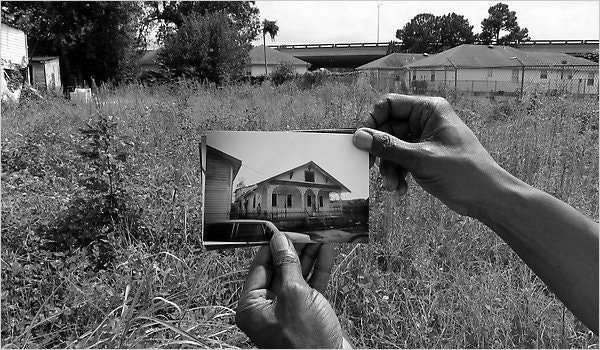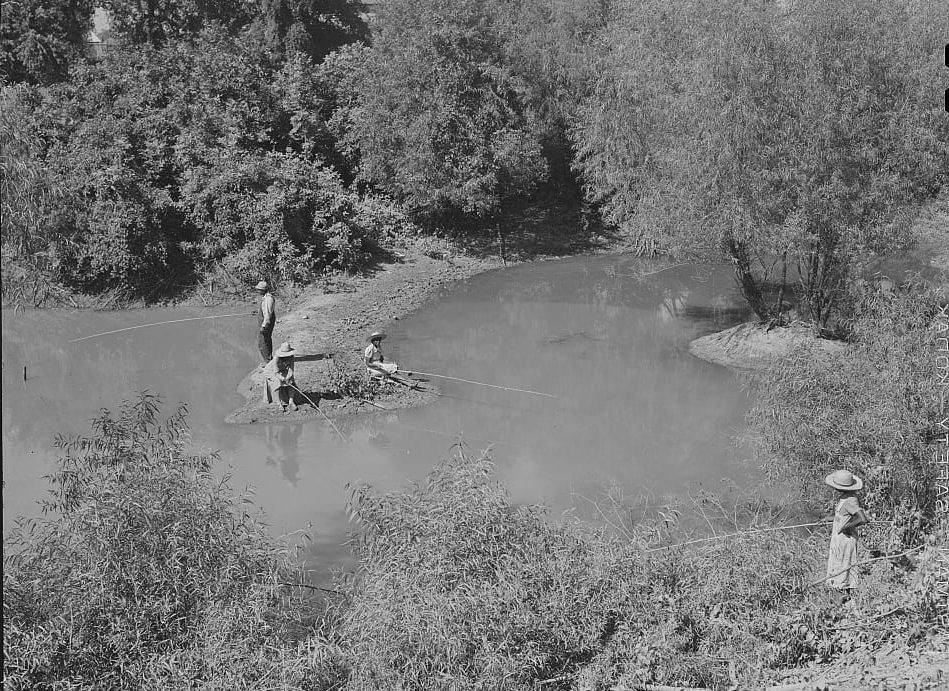A conversation between Dr. Justin Hosbey, assistant professor of Anthropology and co-founder of the Black Ecologies Initiative through the Institute for Humanities Research at Arizona State University, and John Gulledge, PhD Candidate in English at Emory.

Black Ecologies “provides a way of historicizing and analyzing the ongoing reality that Black communities in the US South and in the wider African Diaspora are most susceptible to the effects of climate change, including rising sea levels, subsidence, sinking land, as well as the ongoing effects of toxic stewardship.” You can learn more about the project by following the ongoing discussion series hosted by Black Perspectives of the African American Intellectual History Society (AAIHS). More recently, Dr. Hosbey joined a roundtable discussion on Race and the Environment, which was hosted by the American Society for Environmental History.
John Gulledge: In reading your essay “Mapping Black Ecologies,” one of the first things I noticed about the project is how it developed from a sense of simplicity on which you could then build. What struck me most about this simplicity is how it lends itself so readily to a kind of public scholarship. I get the sense than you are not just speaking to a room full of the same academics, but to a much larger group and with greater reach. Is that sense of audience important to the main goals of Black Ecologies?
Justin Hosbey: It is because, you know, part of what we wanted to do was to create kind of a research hub and initiative that would begin to critically consider the ways that particularly Southern black communities are living on the edge of climate change while also thinking through the historical record. Then there’s also thinking ethnographically at what are some ways that are more emic to how you can think through climate change—actually pretty sustainable ways of living— that we can learn from at least other communities.
JG: There’s something revolutionary and revisionary about reframing the narrative in that way. It seems self-evident, but I wonder if you could say more about how important memory and this kind of attention to historical record is to the project?
JH: I think they get kind of tired with just the racial violence in the history of slavery, which can make it like this “Oh my god, irredeemable” thing. And, we’re trying to say that we want to reckon with that history, but also, there’s more to it: various kinds of homegrown ways of thinking through sustainability, and thinking through trying to survive climate catastrophe that perhaps we can learn a lot from. I think this project is in some ways to help provide a basis to see those projects in the hopes we might uncover some of those histories.
JG: I always wonder at how people get to projects of this scope. What led you here? What inspired you to think and build on it?
JH: My collaborator on Black Ecologies, JT Roane, is a historian at Arizona State, and for us, I think that we both do work in coastal regions. I’m in the US South and for him, he worked on the Tidewater Virginia area where he’s actually from, and I work in New Orleans. And I think a catalyst for me was Hurricane Katrina and doing my own research there. But, for JT, a tornado actually hit and destroyed the Tidewater area. Some of the clips in the article are from that aftermath and recovery. That tornado destroyed his family’s home church and a lot of his community. I think that when that happened, we just thought, wow, there’s a corpus of knowledge that has been created by black communities who had been abandoned by the state. So they have to, by necessity, create ways of digging into sustainability and thinking through how to survive the climate crisis that nobody’s really tapping into. For us, we thought about what’s happening now in our world and the ways we might prioritize local mutual aid based ways of thinking that have been going on in this coastal areas. And then, of course, layers of histories of slavery in those places. Everything was converging for us and I think we just thought we have to do this now. There was a very real urgency to what connected these things for us.
There’s a corpus of knowledge that has been created by black communities who had been abandoned by the state. So they have to, by necessity, create ways of digging into sustainability and thinking through how to survive the climate crisis that nobody’s really tapping into.
JG: You just mentioned the clips you have in the article, which I thought were really, really striking and powerful, and I know that you’ve said Black Ecologies is making use of historical record to lay bare other parts of the present moment. One of the things I loved about these clips is the feeling of immediacy to the event. We don’t often get that when working in the archives. But this has that presence to it, very much a living archive. In that way, how do you see your role in relation to the community? Is there ever a tension between your role of ethnographer and community partner?
JH: Yeah, I think part of it is that for us, this is personal. These are our communities, right? We know people who’ve lost their lives and who continue to survive. And so in a sense, we’re not really thinking about how this reads academically; we’re not worried about what this does for us in terms of our academic careers. I think that we want to use resources that are available to us through the Academy to help seed projects and help fund artists and local historians who are in these areas. I think that part of what happens with the academic industrial complex is that, sure, for the grant cycle, we can help support this project. But then, when Mellon says no more, then what it is, it becomes kind of a relic at that point.
What we want to see are projects that can live a life of their own when that initial support is gone. What is boils down to is, how do we help seed projects and help build the capacity for mutual aid in these communities? What happens to these communities if the state abandons them as the climate crisis continues to unfold? And what are some ways we can think of sustainable living in the absence of the state? That’s what guides my own way of thinking about partnerships as well, because for me, it’s not really about me as an ethnographer, investigating it and doing a cultural critique of what’s happening, and but it’s more so about know how are people thinking through space and place in history and histories of slavery and ecological change? And, then how we can translate that support for local artists and to support local community-based organizations. I think our approach to partnership is not really in terms of participatory action research, or anything like that. I think it’s really about working in a way that shares our resources with communities.

JG: Related to that, I wonder how you envision the project’s relationship to broader disciplinary commitments. I know this isn’t a primary motivation or purpose, but it seemed to me as I was reading, that there is subtle commentary on what the ethnographer can be, could be, and should be. To what extent do you see Black Ecologies as a charge, or indictment even, of ethnography?
JH: I’ve really thought critically over the past year given what’s happened in the world, and I thought critically about anthropology and ethnography as a mode of inquiry. I’ve come to the conclusion that anthropology is a lot like policing. Ethnography is policing. Participant observation is policing. And that’s not ever what I wanted to sign up for. Right? So, I began thinking, what are some ways that I can retreat away from certain investments in the discipline? I even think about the terms we use: when we think about ethnography, we think we are going to “investigate,” we are going to “interrogate.” I want to rethink that approach completely and recede from it as a model of inquiry.
I’ve come to the conclusion that anthropology is a lot like policing. Ethnography is policing. Participant observation is policing. And that’s not ever what I wanted to sign up for.
JG: That’s a really great point and it’s not just in the social sciences. Something that has been gaining steam for a while now is this notion of disciplining disciplines and/or undisciplining them toward more mixed genres and forms of knowledge production. Where do you see Black Ecologies in those kinds of larger movements and experimentations in, say, being “undisciplined”?
JH: I actually think that the project is inherently interdisciplinary in that exact sense. JT is a trained historian, and I’m an anthropologist, and in many ways, we’re trying to ask, how do we really think through history without necessarily engaging in historiography? How do we think through cultural life without thinking through ethnography? One thing we’ve noticed in our work is that when we realize we’re leaning too heavily towards one discipline; I think instinctively we run back a bit and reassess. For us, a part of being “undisciplined,” is recognizing what disciplinary inquiry actually is structured and designed to do and perpetuate.
JG: And it’s not just your methods or approach, right? It’s also in the kind of textures that you seem to be getting at with all your multimodal approach to this cultural, historical record. So, even with regards to the evidence, I wonder what you see as the disciplinary stakes or even just the stakes in making these kinds of choices?
JH: Partially, it’s because we are also rooted in Black Studies. And I think, being Black Studies scholars, what that means is that oftentimes, you rely on ephemera, or you rely on kinds of things that are unstated and unseen. So, I think that commitment to kind of thinking through black life requires us to think in those ways. At the heart of it is taking seriously black life, and taking seriously the contributions that black people make, to understanding their situation, their condition in this country, and the critiques that they make. And by taking that seriously, it means that moving beyond it, you must go beyond current traditional ways of thinking through the archive, thinking about evidence, for example. Even the word, “evidence” brings us back to policing. If you take black life seriously, we kind of have to undo the markers of legitimacy that we typically kind of judge evidence by. I think that’s why a short clip off someone’s phone from when they drove through the aftermath of a tornado, thinking and speaking about what used to be there, is just as important as an essay on the Anthropocene. It’s all the same critique for me, and the essay is not any more legitimate.